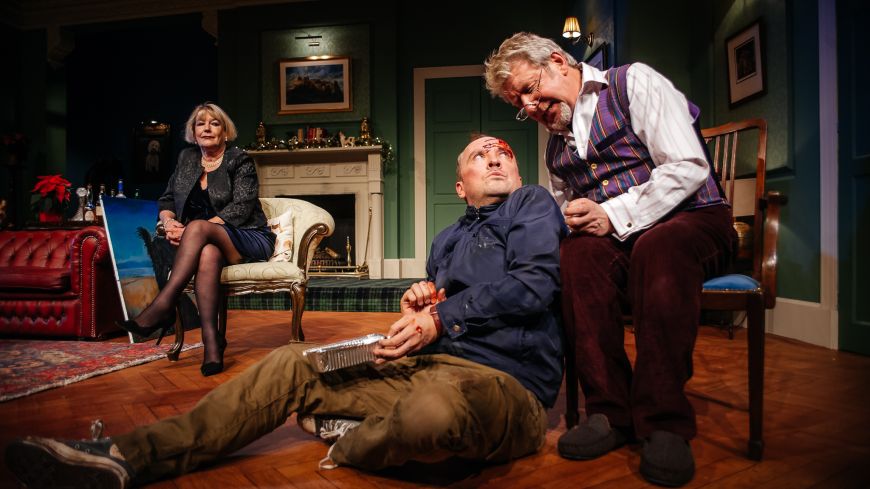
Lara and Cameron get rather more than they bargained for in Iain Finlay Macdonald’s ‘The Devil Masters’. We, the audience, perhaps get rather less.
A box set is something of a rarity these days, and took this reviewer back to his am-dram stage management roots. Here it represents the solid comfort of leafier Edinburgh and the cosiness of Lara and Cameron’s residence in pre-Christmas luxuriousness.
Comfort there is none, however, when jakey John purloins their prize pooch with a view to extracting a ransom for the hound.
Cue a battle of wills and shifting positions as haute bourgeois and proletariat contest control of each other’s person and of the territory they inhabit.
It didn’t quite work for this reviewer on a number of levels, although it is difficult to discern whether script or direction left John Bett’s Cameron caught between faux-bonhomie and the kind of vocalised sense of entitlement audible half-way across a grouse moor, Keith Fleming’s John marooned between a life of previous privilege and present impoverishment, or indeed Barbara Rafferty’s Lara as one half of a double act centred on West Coast / East Coast rivalry.
The plot itself seems at times equally confused in terms of its direction – moral fable giving way to locked-room drama, with the violent behaviours of class against class at points of the literal kind, and while there is political analysis at which Antonio Gramsci might have nodded in approval, it’s rarely sharp enough to cut through either the comic or serious moments of the play and illuminate either the stage or us.
Previously at this time of year the Traverse have offered the city’s young and young-at-heart some imaginative alternatives to pantomime; one speculated as to whether this departure was intended to ‘grow new audiences’ as the vocabulary of the present age has it. However, although a packed house on a second night would normally be cause for rejoicing, in theatre, as in other areas of enterprise and endeavour, the bottom line is not entirely made up of bums on seats.
As one of Howard Barker’s poetic personas suggests, emerging (one imagines from one of Barker’s challenging plays) ‘because it was hard I felt honoured’. Audiences deserve some relief from a continuous treadmill of didacticism, but also deserve to be honoured with work that engages and enlightens as well as entertains, and to fail to do so risks diminishing that audience in both senses.
One can but hope that the next year’s offerings from the Traverse bring lightness and gravitas in equal measure.
Til 24 December 2014. £16 (Concessions £8/£13)

